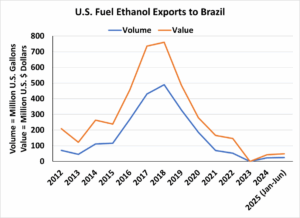The biofuels industry generally seems pleased with the EPA decision today on a backlog of Small Refinery Exemption (SRE) petitions, granting full exemptions to 63 petitions, granting partial exemptions to 77 petitions, denying 28 petitions, and determining 7 petitions to be ineligible.
Renewable Fuels Association (RFA) President and CEO Geoff Cooper says the approach seems reasonsable, but they will be studying it further. “While RFA continues to doubt that the small refineries receiving exemptions today truly experienced ‘disproportionate economic hardship’ due to the RFS, we are pleased to see EPA taking an approach to implementation of these exemptions that is minimally disruptive to the marketplace and affirms the agency’s intent to reallocate renewable fuel volumes lost to SREs. We appreciate that EPA is focused on an approach that maintains stability in the marketplace and ensures finalized annual volumes under the RFS are maintained,” said Cooper.
“In the days ahead, RFA will be further analyzing EPA’s new approach and rationale for determining disproportionate economic hardship. According to EPA’s previous analysis, all refiners—both small and large—recoup their RIN costs when they sell gasoline and diesel. Thus, there is no credible evidence that small refiners are disproportionately affected by RFS compliance, or that the financial impact of RFS compliance rises to a level anywhere close to ‘economic hardship.’ In any case, SREs were always intended to be a temporary measure and a bridge to compliance—not a permanent handout. Small refiners have now had two full decades to adapt their operations to comply with the RFS.”
American Coalition for Ethanol (ACE) CEO Brian Jennings commented on the decision at the end of the organization’s annual meeting today. “I think they threaded the legal needle about as well as they could have,” said Jennings. “It’s possible there will be additional litigation. You you had 63 full waivers. Are we going to challenge those? Are those refineries that were denied going to say we should have gotten an exemption? And do they litigate that maybe? The thing we have going for us is that any litigation on this front based on the Supreme Court ruling earlier this year has to go through the DC Circuit and that’s a better venue for these cases.”
ACE CEO Brian Jennings comments (3:46)










